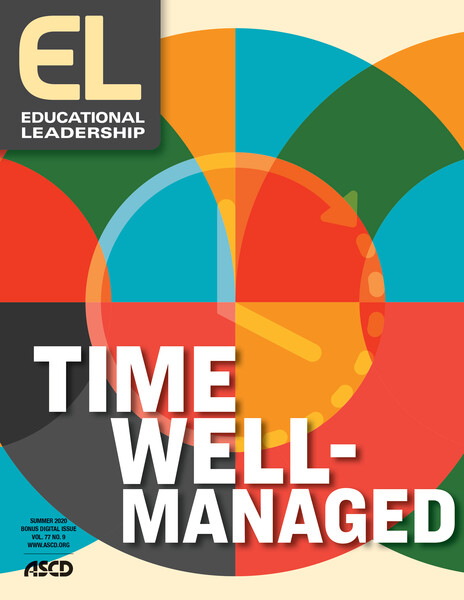Our editorial team selected the topic of time management for this summer issue of Educational Leadership several months ago. At the time, we reasoned that looking at ways to improve how time is used in schools and in educators' lives could be helpful to readers in planning and making changes for the new school year. Little did we know that, by the time we published the issue, just about everybody's schedules would be upended and the whole notion of student learning time would be in flux.
Obviously, the coronavirus pandemic has profoundly disrupted the way educators live, work, teach, and lead, and there's still little certainty as to when things might return to normal. To account for these new circumstances, we considered changing the focus of this issue, but then thought better of it. That turned out to be a good decision: As we started piecing together the issue, it quickly became clear to us that the topic of time management—or reconceptualizing how educators use time—was even more important now than it had been when we first came up with the idea. For the foreseeable future, we all need to organize our lives and work differently, and this issue offers no shortage of thoughtful reflections and ideas on addressing that challenge for educators.
In the lead article, for example, Chris Gabrieli and Colleen Beaudoin make the provocative case that, while conducted under far from ideal circumstances and beset by problems, the recent mass experiment in remote learning could help schools break free of "archaic" conventions around scheduling and student seat time. "While nearly everyone pines for a return to ‘normal,'" they write, "we believe we must learn from what has worked while being forced to teach in this way—and what hasn't." The results of that effort could not only create more flexible approaches for schools' reopening in the fall but also generate more diverse and responsive formats for learning in the future.
Other articles focus on ways schools and educators can better prioritize instructional time even in conventional classroom settings—a critical issue given the learning loss many students will need to make up this fall. Researcher Matthew A. Kraft, for example, looks at the surprising effects of everyday classroom interruptions on learning and offers practical suggestions for curtailing such disruptions. (Hint: This might be a good year to cut back on the intercom announcements.) Meanwhile, school leaders Douglas Fisher and Nancy Frey discuss common practices that effective teachers use to avoid squandering valuable instructional time.
Appropriately for the topic, this issue also features advice pieces on personal time management for educators. Superintendent PJ Caposey offers powerful reframing strategies that can help school leaders devote more time to doing "work of significance"—the "mentally complex work" that moves the needle in schools. And perhaps even more in the spirit of the moment, teacher Chase Mielke recounts his own efforts to simplify his life and become more intentional about how he spends his time. For him, this has meant extracting himself from "the super-teacher complex" and getting past the notion that busyness equates to achievement. The process, he says, has made him a more attentive and more energetic teacher.
Those are qualities all educators will need as we head into a new school year that is likely to be highly complex and challenging on numerous fronts. As you read this issue, you might ask yourself—as several of our authors suggest—how you and your colleagues can let go of old systems and patterns and find time and space for what you and your students need now.





